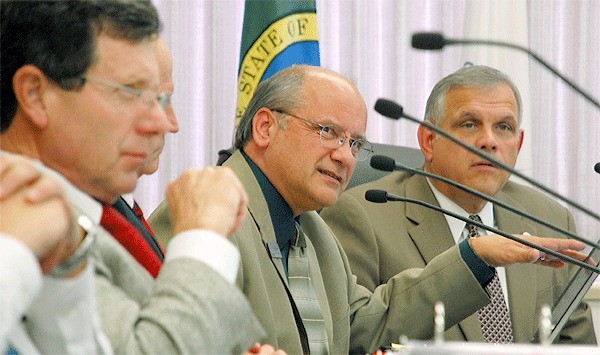The Oak Harbor City Council is expected to vote on rules that will formalize its standing committee meeting policies next week, but the proposal still raises concerns from a state Attorney General’s Office official.
Should the ordinance be adopted as is, the city’s four standing committees – finance, government services, public safety, and public works – will officially become “regular meetings” of the council. That means they can be attended by all seven council members, despite the forming of a quorum, and be able to discuss current or upcoming city business. The ordinance does not, however, permit the council to take final action on any issue with a formal vote.
In March, the council came under fire when Tim Ford, open government ombudsman for the Attorney General’s Office and an expert in the state’s open government laws, told a Whidbey News-Times reporter that the City Council should be advertising its standing committee meetings as “special meetings of the council” whenever a quorum was present and council members were talking about city business.
The purpose behind the “special” designation is to let the public know that elected officials will be gathering, just like they do at formal and regularly scheduled meetings, and that they could be discussing or deciding issues of public importance.
City Attorney Margery Hite maintains that the standing committee meetings were always advertised appropriately, as they were advertised as open public meetings, and that the proposed change had nothing to do with Ford’s comments. The purpose of the formal policy change is to clarify with the public and memorialize in city code that standing committee meetings are meetings of the City Council.
“I don’t think there was ever a problem,” Hite said. “I think it was always properly done.”
However, she said the change should address Ford’s concerns. By formally making all standing committee meetings regular meetings of the council, they are no longer “special” and do not need to be advertised as such.
However, Ford does not agree. After reviewing a copy of the proposed ordinance, he said the city can’t simply dodge the “special meeting” notice requirement by turning standing committee meetings into regular meetings of the council. They aren’t the same, he said.
“There is an important distinction here,” Ford said.
The public can reasonably expect that a quorum of council members will attend the council’s regular “full” meetings, which occur on the first and third Tuesday of the month, because its required by law. However, the proposed ordinance doesn’t require a quorum and excuses any council member from not attending. Without that clear accountability, the public won’t ever really know when a quorum of council members will meet and discuss important city business.
“This is not splitting hairs,” Ford said.
Oak Harbor City Council member Jim Palmer said he was concerned about the issue when it was first addressed, but that he now believes the council never did anything wrong. The issue revolved around a pubic works meeting in early May that was attended by every council member expect Jim Campbell. Palmer claimed a photograph in a March 12 story in the Whidbey News-Times that showed the attending council members huddled around plans for the Pioneer Way improvement project was misleading. Only the three council members on the standing committee talked about city business, he said. Ford’s comments may have been based on inaccurate information, he said.
“I don’t think Mr. Ford knew everything about that meeting,” Palmer said.
Again, Ford said that is not accurate.
“My comment is still the same as it was earlier this year,” Ford said.
He also made his position clear in a March 16 letter to the city. While his comments do not carry the same weight as an official opinion from the attorney general’s office, his job is to provide the public with information about the Open Public Meetings Act. In his letter, he specifically addressed the difference between standing committee meetings advertised as open public meetings and those of regular “full” council meetings.
“If a majority of the council attends a committee meeting, it is both a meeting of the committee and of the council,” he wrote. “Notice of a special meeting of each must be separately provided.”
He also spelled out when a meeting becomes an official public meeting.
“A meeting is anytime action takes place and ‘action’ is defined very broadly to mean: ‘the transaction of the official business of a public agency by a governing body including but not limited to receipt of public testimony, deliberations, discussions, considerations, reviews, evaluations and final actions,’” Ford wrote.
Along with making the standing committees regular meetings of the council, the proposed ordinance also clarifies where and when the meetings will be held. They will continue to take place in locations other than the council’s official meeting chambers, and will be held at different times, ranging from 7 a.m. to 3:30 p.m. Also, none will be taped and broadcast on channel 10, the city’s pubic television information channel.




